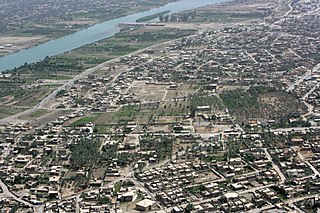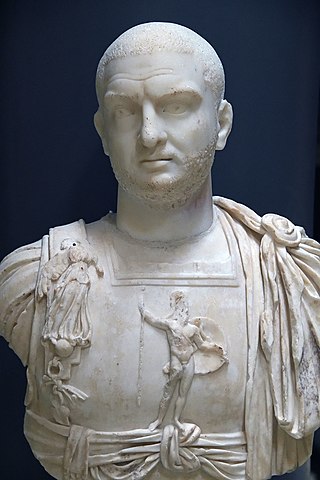
Anbar also known by its original ancient name, Peroz-Shapur, was an ancient and medieval town in central Iraq. It played a role in the Roman–Persian Wars of the 3rd–4th centuries, and briefly became the capital of the Abbasid Caliphate before the founding of Baghdad in 762. It remained a moderately prosperous town through the 10th century, but quickly declined thereafter. As a local administrative centre, it survived until the 14th century, but was later abandoned.

Publius Licinius Egnatius Gallienus was Roman emperor with his father Valerian from 253 to 260 and alone from 260 to 268. He ruled during the Crisis of the Third Century that nearly caused the collapse of the empire. He won numerous military victories against usurpers and Germanic tribes, but was unable to prevent the secession of important provinces. His 15-year reign was the longest in half a century.
The 190s decade ran from January 1, 190, to December 31, 199.
The 260s decade ran from January 1, 260, to December 31, 269.
Year 197 (CXCVII) was a common year starting on Saturday of the Julian calendar. At the time, it was known as the Year of the Consulship of Magius and Rufinus. The denomination 197 for this year has been used since the early medieval period, when the Anno Domini calendar era became the prevalent method in Europe for naming years.

Valerian was Roman emperor from 253 to spring 260 AD. He persecuted Christians and was later taken captive by the Persian emperor Shapur I after the Battle of Edessa, becoming the first Roman emperor to be captured as a prisoner of war, causing shock and instability throughout the Roman Empire. The unprecedented event and the unknown fate of the captured emperor generated a variety of different reactions and "new narratives about the Roman Empire in diverse contexts".

Shapur I was the second Sasanian King of Kings of Iran. The dating of his reign is disputed, but it is generally agreed that he ruled from 240 to 270, with his father Ardashir I as co-regent until the death of the latter in 242. During his co-regency, he helped his father with the conquest and destruction of the Arab city of Hatra, whose fall was facilitated, according to Islamic tradition, by the actions of his future wife al-Nadirah. Shapur also consolidated and expanded the empire of Ardashir I, waged war against the Roman Empire, and seized its cities of Nisibis and Carrhae while he was advancing as far as Roman Syria. Although he was defeated at the Battle of Resaena in 243 by Roman emperor Gordian III, he was the following year able to win the Battle of Misiche and force the new Roman Emperor Philip the Arab to sign a favorable peace treaty that was regarded by the Romans as "a most shameful treaty".

Philip the Arab was Roman emperor from 244 to 249. He was born in Aurantis, Arabia, in a city situated in modern-day Syria. After the death of Gordian III in February 244, Philip, who had been Praetorian prefect, achieved power. He quickly negotiated peace with the Persian Sassanid Empire and returned to Rome to be confirmed by the Senate. During his reign, the city of Rome celebrated its millennium.

Gaius Vibius Trebonianus Gallus was Roman emperor from June 251 to August 253, in a joint rule with his son Volusianus.

Shahrbaraz, was shah (king) of the Sasanian Empire from 27 April 630 to 9 June 630. He usurped the throne from Ardashir III, and was killed by Iranian nobles after forty days. Before usurping the Sasanian throne he was a spahbed (general) under Khosrow II (590–628). He is furthermore noted for his important role during the climactic Byzantine–Sasanian War of 602–628, and the events that followed afterwards.

Dura-Europos was a Hellenistic, Parthian, and Roman border city built on an escarpment 90 metres above the southwestern bank of the Euphrates river. It is located near the village of Salhiyé, in present-day Syria. Dura-Europos was founded around 300 BC by Seleucus I Nicator, who founded the Seleucid Empire as one of the Diadochi of Alexander the Great. In 113 BC, Parthians conquered the city, and held it, with one brief Roman intermission, until 165 AD. Under Parthian rule, it became an important provincial administrative centre. The Romans decisively captured Dura-Europos in 165 AD and greatly enlarged it as their easternmost stronghold in Mesopotamia, until it was captured by the Sasanian Empire after a siege in 256–57 AD. Its population was deported, and the abandoned city eventually became covered by sand and mud and disappeared from sight.
Balista or Ballista, also known in the sources with the name of "Callistus", was one of the Thirty Tyrants of the controversial Historia Augusta, and supported the rebellion of the Macriani against Emperor Gallienus.

The siege of Amida was a military investment of the Roman fortified frontier city of Amida by the Sasanian Empire. It took place in AD 359 when the Sasanian army under king Shapur II invaded the eastern provinces of the Roman Empire. Shapur wanted to exploit the absence of the Roman Emperor Constantius II who was overseeing affairs in the western part of the Empire. The city fell, but the strategic gain was little.
The Roman–Persian Wars, also known as the Roman–Iranian Wars, were a series of conflicts between states of the Greco-Roman world and two successive Iranian empires: the Parthian and the Sasanian. Battles between the Parthian Empire and the Roman Republic began in 54 BC; wars began under the late Republic, and continued through the Roman and Sasanian empires. A plethora of vassal kingdoms and allied nomadic nations in the form of buffer states and proxies also played a role. The wars were ended by the early Muslim conquests, which led to the fall of the Sasanian Empire and huge territorial losses for the Byzantine Empire, shortly after the end of the last war between them.

The Battle of Misiche, Mesiche (Μεσιχή), or Massice was fought between the Sasanians and the Romans in Misiche, Mesopotamia.
The Grivpanvar were an elite late Parthian and Sasanian division who fought as heavy cataphract cavalry. According to Roman sources, the Grivpanvar had the ability to impale two men on the long, heavy spears that they carried. Historical evidence suggests that the heavily armoured Parthian grivpanvar were at least partially influenced by the military of the Central Asian steppes, who in turn had inherited their armoured cavalry traditions from the Massagetae and the late Achaemenid Persians.

Julian's Persian expedition began in March 363 AD and was the final military campaign of the Roman emperor Julian. The Romans fought against the Sasanian Empire, ruled at the time by Shapur II.
During the siege of Maiozamalcha, 363 CE, the Roman army under Emperor Julian stormed, pillaged, and destroyed the city of Maiozamalcha, before continuing onward to the Sasanian capital of Ctesiphon.

The Gordian dynasty, sometimes known as the Gordianic dynasty, was short-lived, ruling the Roman Empire from 238 to 244 AD. The dynasty achieved the throne in 238 AD, after Gordian I and his son Gordian II rose up against Emperor Maximinus Thrax and were proclaimed co-emperors by the Roman Senate. Gordian II was killed by the governor of Numidia, Capillianus and Gordian I killed himself shortly after, only 22 days after he was declared emperor. In 238, Pupienus and Balbinus, who were not of the Gordian dynasty, were declared co-emperors but the Senate was forced to make Gordian III a third co-emperor in 238, due to the demands of the Roman people. Maximinus attempted to invade Italy but he was killed by his own soldiers when his army became frustrated. After this, the Praetorian Guard killed Pupienus and Balbinus, leaving Gordian III as the sole emperor. Gordian III ruled until AD 244 when he was either killed after his betrayal by Philip the Arab, or killed at the Battle of Misiche; with his death, the dynasty was ended and Philip the Arab became emperor.
The Perso-Roman wars of 337–361 were a series of military conflicts fought between the Roman Empire and the Sasanian Empire between 337 and 361. They were a result of long-standing competition between the rival powers over influence in the border kingdoms of Armenia and Iberia, as well as the desire of Shapur II, after his Arab campaign, to revoke the unfavorable terms of the Treaty of Nisibis, which had concluded the previous war between the empires. Though the Romans under Constantius II were defeated in several sanguinary encounters, Shapur was unable to secure a decisive victory.











